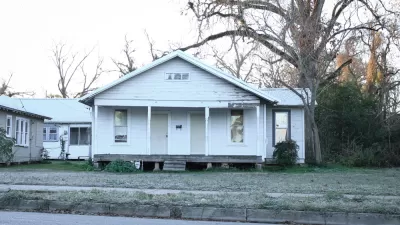Days before facing reelection, Governor Newsom rejected every California locality’s plan for addressing homelessness, calling the proposals inadequate in fighting the massive crisis in a state where over 100,000 people are unhoused.

The battle over housing in California continues, with Governor Gavin Newsom—up for reelection today—rejecting every city’s proposed plan to help the growing number of residents experiencing homelessness, reports Anita Chabria in the Los Angeles Times.
Around the state, local opposition has stymied efforts to build affordable housing. “Time and again, people agree that the current situation is untenable and something’s got to give — as long as they’re not the ones who have to give it,” Chabria explains.
Chabria points out that while the move is “largely symbolic,” it could motivate cities to draft more aggressive plans and imperil hundreds of millions of dollars in state funding that could be withheld until cities and counties put forward more aggressive plans. “Newsom is sending an unexpected but clear message that the relationship between the state and local entities is about to change when it comes to homelessness. He seems genuinely willing to jump onto that third rail of politics, local control — similar to what the administration has done in cracking down on places that refuse to build their fair share of affordable housing.”
In a separate article on CalMatters, Manuela Tobias criticizes Newsom’s own record on housing. Tobias points out that, after campaigning with big promises on housing, “Just 13% of the 3.5 million homes he campaigned on building have been permitted, let alone built.” And while California cracked down on cities over their Regional Housing Needs Assessment plans, some local leaders say the state doesn’t offer enough subsidies and other support to build the needed housing units.
FULL STORY: Column: Newsom rejects every local homeless plan in state, demanding more ambition

Study: Maui’s Plan to Convert Vacation Rentals to Long-Term Housing Could Cause Nearly $1 Billion Economic Loss
The plan would reduce visitor accommodation by 25,% resulting in 1,900 jobs lost.

North Texas Transit Leaders Tout Benefits of TOD for Growing Region
At a summit focused on transit-oriented development, policymakers discussed how North Texas’ expanded light rail system can serve as a tool for economic growth.

Why Should We Subsidize Public Transportation?
Many public transit agencies face financial stress due to rising costs, declining fare revenue, and declining subsidies. Transit advocates must provide a strong business case for increasing public transit funding.

How to Make US Trains Faster
Changes to boarding platforms and a switch to electric trains could improve U.S. passenger rail service without the added cost of high-speed rail.

Columbia’s Revitalized ‘Loop’ Is a Hub for Local Entrepreneurs
A focus on small businesses is helping a commercial corridor in Columbia, Missouri thrive.

Invasive Insect Threatens Minnesota’s Ash Forests
The Emerald Ash Borer is a rapidly spreading invasive pest threatening Minnesota’s ash trees, and homeowners are encouraged to plant diverse replacement species, avoid moving ash firewood, and monitor for signs of infestation.
Urban Design for Planners 1: Software Tools
This six-course series explores essential urban design concepts using open source software and equips planners with the tools they need to participate fully in the urban design process.
Planning for Universal Design
Learn the tools for implementing Universal Design in planning regulations.
City of Santa Clarita
Ascent Environmental
Institute for Housing and Urban Development Studies (IHS)
City of Grandview
Harvard GSD Executive Education
Toledo-Lucas County Plan Commissions
Salt Lake City
NYU Wagner Graduate School of Public Service





























